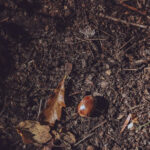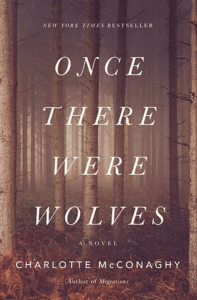
![]()
Once There Were Wolves
Charlotte McConaghy
Book Club
“There are languages without words and violence is one of them.”
Biologist Inti Flynn has arrived in the Scottish Highlands with wolves and secrets — the former intended for release, the latter for close keeping. The locals are afraid, but Inti believes that “rewilding” is what’s best for the planet. Things become more complicated when Inti finds eviscerated human remains in the forest. Worried her wolves will be blamed, she conceals the evidence. The only thing more horrifying than the possibility that the wolves are responsible is that a human is. What lengths will Inti go to to protect the beings she loves?
I’ve read portions of this book twice, checked out hundreds of reviews, and discussed it for several hours with my book club — and I still don’t think it deserves the hype. The author tried to say so much about so many topics (rewilding, trauma, family relationships, wolves, synesthesia, abuse, etc.) that she ends up saying too little about any of it. The metaphor of “Wolves aren’t the monsters, humans are” was so heavy-headed it was like being bludgeoned, and so much of the plot had to be pretzeled to fit into that metaphor that it lost most of its believability. There are no likeable characters. McConaghy says she “wrote this novel out of a sense of profound distress over the loss of our natural world,” but mostly ends up focusing on everything except that topic. She took the makings of a really interesting psychological thriller and stuck in some stuff about rewilding and wolves — with the result being a muddled mess I wish I hadn’t spent time reading.
A disappointing start to July reading.
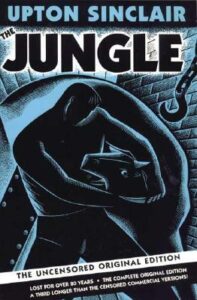
The Jungle
Upton Sinclair
DNF
“This was in truth not living; it was scarcely even existing, and they felt that it was too little for the price they paid. They were willing to work all the time; and when people did their best, ought they [not be] able to keep alive?”
When Jurgis Rudkus emigrates from Lithuania to the United States, he believes “the American Dream” will soon be in his reach. What he doesn’t understand is that he has just become a replaceable cog in a machine designed to grind down everything in its path. Brutal working conditions, wage theft, and corporate greed wear down his family’s bodies and minds, forcing them to take desperate measures just to survive. It’s only years later, after incalculable losses, that Jurgis discovers what he believes is the solution to the exploitation of millions.
Many people know that The Jungle led directly to the passing of the first federal food safety regulations in the US. What’s less well known is that Sinclair’s novel was originally intended to showcase the dangers of industrial capitalism and put forth Socialism as the golden solution. While it’s had an impact on the food industry and high school English classes, I think it’s a better conversation prompter than a successful novel. The allegory is heavy-handed, the plot is too slow, and the Socialism portion comes too late. It felt like Sinclair sewed portions of two books together and ended up with a third mediocre one. It probably doesn’t help that the revelatory information he shared in 1905 isn’t shocking to the modern reader. Slaughterhouses treat animals poorly? Immigrants are taken advantage of because they’ll take the lowest paying jobs? Some people think moving toward Socialism is a great (or terrible) idea? These topics lack their original punch because they’re no longer new. Lots has changed, but I believe we’ll always be looking for better ways to live.
Worth picking up if you don’t mind a slow plot and are looking for an impactful historical read.
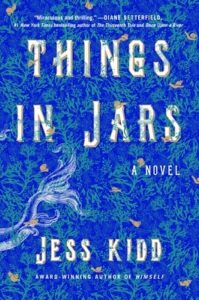
![]()
Things in Jars
Jess Kidd
“Here is time held in suspension. Yesterday pickled. Eternity in a jar.”
Bridie Devine doesn’t believe in the supernatural. She’s a scientist, after all — or she would be if women were allowed to pursue such education. Instead she makes do as a detective, taking cases too uninteresting or perplexing to the police. Her most recent case falls into the latter category: The secret child of Sir Edmund Berwick has been kidnapped, and rumors of her peculiar nature have landed in the ears of “collectors” throughout London. It’s up to Bridie (and some additional peculiar people) to recover the child before it’s too late.
I’m a sucker for a Victorian mystery with a smart woman at its center, so of course I couldn’t resist picking this up. I appreciated the more unexpected elements, including Bridie’s seven-foot-tall housemaid and supernatural creatures other than vampires. But by the end it was like I was reading two separate books. Kidd swung from deep, poetic descriptions of ravens in flight to characters spouting exposition at each other. I felt like I was being told a story instead of experiencing it. My enjoyment of the unusual was not enough to offset my general disengagement.
Potentially a good read for those who are already entrenched in this genre and are looking for something a little quirky.
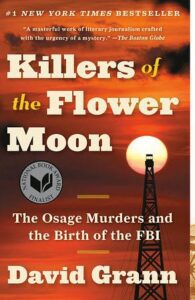
![]()
Killers of the Flower Moon: The Osage Murders and the Birth of the FBI
David Grann
“An Indian Affairs agent said, ‘The question will suggest itself, which of these people are the savages?’ ”
In the boom years leading up to the Great Depression the richest people lived not in New York or California, but in Oklahoma. Members of the Osage Nation were rocketed to wealth by the discovery of oil, but forced to request access to that money through trusts owned by white men. And then they started mysteriously dying — as did the few people who investigated their deaths. It would take years and the intervention of the newly-minted FBI to uncover the despicable truth.
I added this book to my TBR a couple years ago when I heard it was going to be turned into a film — I generally want to know the source material before I visit an adaptation. Grann structures this tale masterfully, dropping the reader into the middle and simultaneously spooling the narrative back to the beginning and out to the almost-unbelievable end. I knew a little bit about the formation of the FBI, and it was interesting to connect that knowledge to a series of crimes I don’t think most people have heard about.
Perfect for readers who love true crime and history told meticulously.
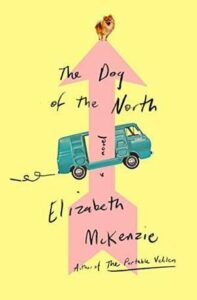
![]()
The Dog of the North
Elizabeth McKenzie
Book Club
“It was uncanny how a stranger might know what you needed better than you did yourself.”
Nothing about Penny’s life is going right. She’s careerless, husbandless, and homeless. Now she’s in Santa Barbara, watching her notoriously fractious grandmother rapidly lose touch with reality. Being back brings up trauma and grief Penny would rather forget, and reveals secrets that make her question whether she can ever be happy again. It will take a beat-up van, a Pomeranian, and several unexpected encounters to help Penny find her way back to herself.
I’m choosing to blame the publisher for not liking this one as much as I thought I would. The blurb refers to the plot as “darkly comedic,” which feels misleading. There are humorous moments, but they tip too far into absurdity — overall the vibe is one of breathtaking anguish. The more complex characters were interesting (if totally unlikable), but the plot meandered and I never felt fully engaged.
A potential good choice if you enjoy surreal character studies.
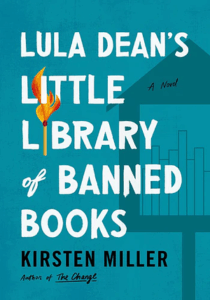
![]()
Lula Dean’s Little Library of Banned Books
Kirsten Miller
“How do you improve yourself without challenging your mind? How do you leave a better world for your children? Delvin wondered. Then he remembered that was the point. People like Lula didn’t want change. They were perfectly happy with the way things were.”
As founder and head of the Concerned Parents Committee, Luna Dean believes it is her mission to rid her small town of “objectionable” reading material. After cleaning off the public and school library shelves, she places a little library in her own front yard — filled with only the most proper and edifying selections. What Lula doesn’t know is that a prankster has filled the library with the very books she has banned. These hidden reads impact their readers in unexpected ways, and soon the stage is set for revelations that will change the town forever.
What a ride! I picked this up expecting enjoyable fluff but ended up diving into complex topics like racism, homophobia, xenophobia, and the power stories have over us. I appreciated the author’s strong stance on the importance of books and how they can change our lives. That said, I wish she’d spent as much time fleshing out the antagonists’ perspectives. Lula Dean and her ilk are hypocrites, pearl-clutchers, and incels. I’ll never agree with people who want to ban books, but having bad guys who are one-dimensional stereotypes weakens the author’s argument. It also makes it easy to have a too-tidy ending, where everything is solved and the town is now a utopia. I enjoyed the experience, but think Miller could have made the book much stronger with a few small changes.
Try this if you love books and love watching nasty people get what’s coming to them.
Photo by Rachel Kelli on Unsplash


